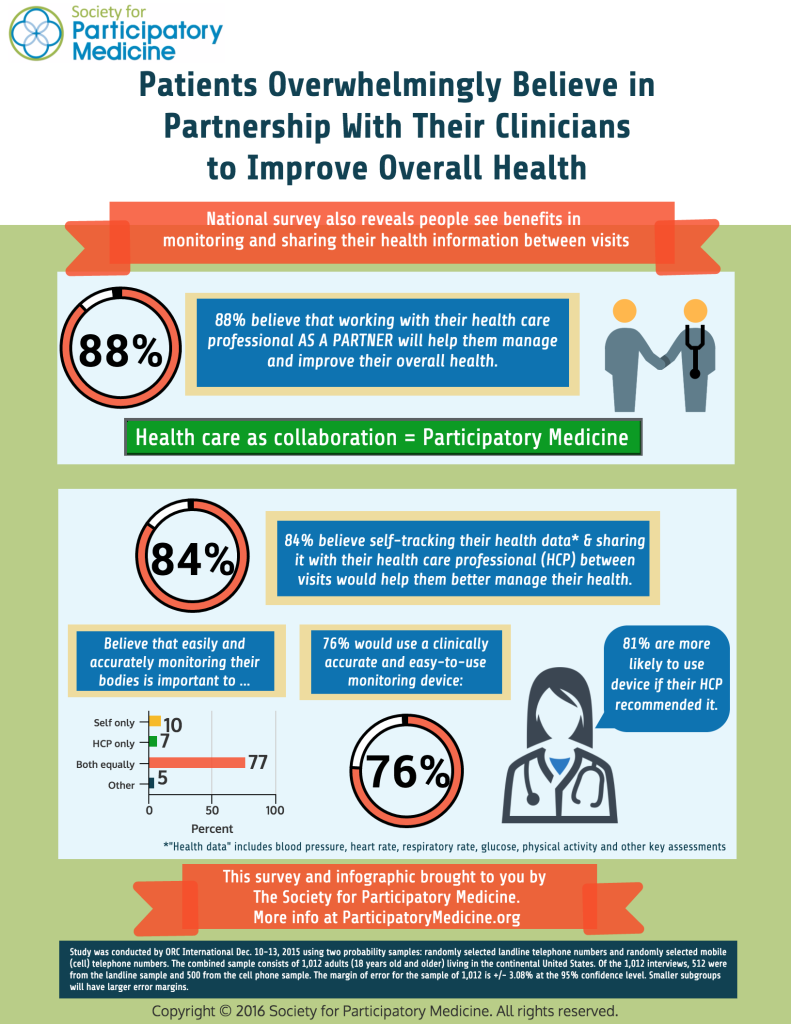The Society for Participatory Medicine released a report of a national survey today finding that a significant majority of Americans seem to consider themselves engaged patients, with positive views of collaborative relationships with providers, self-tracking (and sharing personal health data with providers).
From the presser:
An astounding 88 percent of American adults believe that working with their health care professional as a partner will help them better manage their health, according to a survey released today by the Society for Participatory Medicine and conducted by ORC International. The survey also revealed that overall 84% felt that tracking their own health data between visits – such as blood pressure, heart rate, respiratory rate, glucose, physical activity and other key health metrics – with an easy-to-use device and sharing it with their health care professional would help them better manage their health, with 77% of respondents feeling it was equally important to both themselves and their health care professional.
“What this survey points out is that patients want to become engaged in their own health and collaborate with their health care professionals,” said Daniel Z. Sands, MD, MPH, co-founder and co-chair of the Society for Participatory Medicine and a practicing physician. “Patients view themselves as key contributors of health data to manage their own health between visits, and to share during visits. Ultimately, we believe that this will lead to improved patient outcomes and lower costs to the health care system.”
The survey also revealed that:
- 76 percent of adults would use a clinically accurate and easy-to-use personal monitoring device and 57 percent of respondents would like to use it themselves and also share that information with their health care professional.
- 81 percent of adults would be more likely to use a personal monitoring device if their health care professional recommended it.
Dr. Sands went on to say, “Increasingly, patients are actively monitoring their own health data to better self-manage their health and collaborate with their health care professionals. Self-monitoring is a vital component of an efficient and high-functioning health care system. This survey confirms that this concept resonates with the public and that most respondents are willing to utilize technology to gather this data to improve their health.”
This is an important set of findings but, as they say in the trade, further study is needed. (I would, of course, be happy to learn that these questions have already been addressed.)
- I am encouraged that so many people want to be engaged in their health, but I would like to know whether the current study’s results are significantly different from similar surveys undertaken in the past. We tend to believe that the past was all about Marcus Welby and “doctor knows best.” Is that a gut feeling or is it borne out by data?
- Are health care providers as eager to engage with patients as patients are eager to engage with providers? Are providers interested in receiving the data that patients would like to share with them? (This triggers the recurring conversation about extracting meaningful knowledge from a barrage of data that patients would like to share with clinicians. The type of data, the way it is collected, transmitted and filtered, and the mode of provider reimbursement all affect how open any given health care provider is likely to be to receiving more information from patients. And just what kind of personal tracker data is going to prove useful? I don’t think we know yet.)
- Does data suggest that greater patient engagement yields better clinical outcomes? I know that the Open Notes project yielded positive results. My general sense (without doing a review of the literature) is that many other conclusions to date may be based on self-reported data on patient outcomes and are relatively small-scale.
If clinicians are able to act in a way that allows patients to be more engaged in their care and in communications about their care (as this survey shows is desired) and if patients’ acting on these desires to be more engaged in one’s care can in fact improve outcomes and reduce costs — then we’re on to something.
David Harlow
The Harlow Group LLC
Health Care Law and Consulting
The author chairs the Public Policy Committee of the Society for Participatory Medicine




Check out some of the discussion in the Twittersphere: link to storify.com and feel free to chime in ….
Good questions, David. In my book, “Demanding Medical Excellence,” I debunked the whole Marcus Welby thing. Work done by the AMA (!) found doctors cared too much about money (1954) or the public perceived that they did (1993) or that doctors were acting that way when they shouldn’t (1967), etc., etc. Indeed, when Marcus Welby, MD first aired (we’re dating ourselves: only Boomers remember anything past “House”), the AMA was worried that it would cause unrealistic expectations by patients. Today, people think it was a documentary.
Oh, and those Norman Rockwell paintings? He posed models.
Today’s doctors and patients are, by and large, head and shoulders above their predecessors. Doesn’t deny today’s real problems, but the past was by no means problem-free.
As my father loves to say: Nostalgia isn’t what it used to be. Re: Marcus Welby — I used a still in a presentation recently and the millenial helping me with the laptop had no idea who he was …